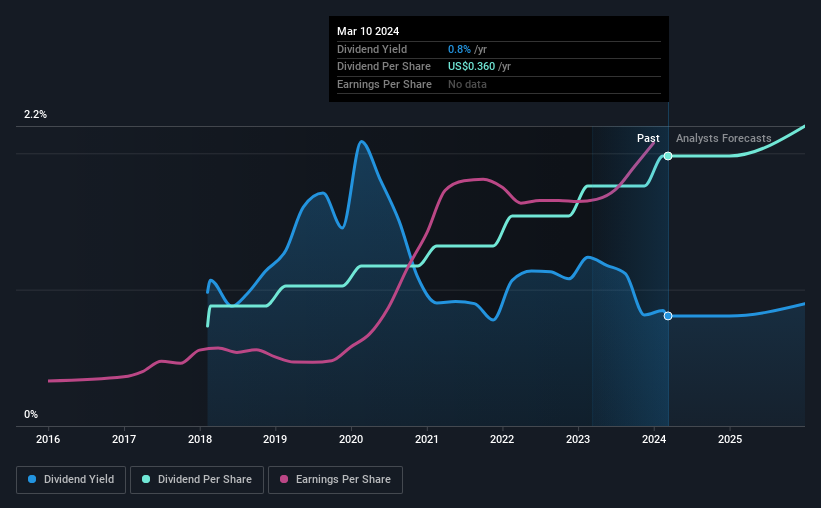Merchants Bancorp (NASDAQ:MBIN) Could Be A Buy For Its Upcoming Dividend
Regular readers will know that we love our dividends at Simply Wall St, which is why it's exciting to see Merchants Bancorp (NASDAQ:MBIN) is about to trade ex-dividend in the next 3 days. The ex-dividend date is one business day before a company's record date, which is the date on which the company determines which shareholders are entitled to receive a dividend. The ex-dividend date is an important date to be aware of as any purchase of the stock made on or after this date might mean a late settlement that doesn't show on the record date. In other words, investors can purchase Merchants Bancorp's shares before the 14th of March in order to be eligible for the dividend, which will be paid on the 1st of April.
The company's next dividend payment will be US$0.09 per share, and in the last 12 months, the company paid a total of US$0.32 per share. Calculating the last year's worth of payments shows that Merchants Bancorp has a trailing yield of 0.8% on the current share price of US$44.60. Dividends are an important source of income to many shareholders, but the health of the business is crucial to maintaining those dividends. That's why we should always check whether the dividend payments appear sustainable, and if the company is growing.
See our latest analysis for Merchants Bancorp
Dividends are typically paid from company earnings. If a company pays more in dividends than it earned in profit, then the dividend could be unsustainable. Merchants Bancorp has a low and conservative payout ratio of just 5.7% of its income after tax. Merchants Bancorp paid a dividend despite reporting negative free cash flow last year. That's typically a bad combination and - if this were more than a one-off - not sustainable.
When a company paid out less in dividends than it earned in profit, this generally suggests its dividend is affordable. The lower the % of its profit that it pays out, the greater the margin of safety for the dividend if the business enters a downturn.
Click here to see the company's payout ratio, plus analyst estimates of its future dividends.
Have Earnings And Dividends Been Growing?
Companies with consistently growing earnings per share generally make the best dividend stocks, as they usually find it easier to grow dividends per share. If business enters a downturn and the dividend is cut, the company could see its value fall precipitously. It's encouraging to see Merchants Bancorp has grown its earnings rapidly, up 33% a year for the past five years.
The main way most investors will assess a company's dividend prospects is by checking the historical rate of dividend growth. In the past six years, Merchants Bancorp has increased its dividend at approximately 18% a year on average. Both per-share earnings and dividends have both been growing rapidly in recent times, which is great to see.
The Bottom Line
Is Merchants Bancorp worth buying for its dividend? When companies are growing rapidly and retaining a majority of the profits within the business, it's usually a sign that reinvesting earnings creates more value than paying dividends to shareholders. This is one of the most attractive investment combinations under this analysis, as it can create substantial value for investors over the long run. Overall, Merchants Bancorp looks like a promising dividend stock in this analysis, and we think it would be worth investigating further.
Curious what other investors think of Merchants Bancorp? See what analysts are forecasting, with this visualisation of its historical and future estimated earnings and cash flow.
If you're in the market for strong dividend payers, we recommend checking our selection of top dividend stocks.
Have feedback on this article? Concerned about the content? Get in touch with us directly. Alternatively, email editorial-team (at) simplywallst.com.
This article by Simply Wall St is general in nature. We provide commentary based on historical data and analyst forecasts only using an unbiased methodology and our articles are not intended to be financial advice. It does not constitute a recommendation to buy or sell any stock, and does not take account of your objectives, or your financial situation. We aim to bring you long-term focused analysis driven by fundamental data. Note that our analysis may not factor in the latest price-sensitive company announcements or qualitative material. Simply Wall St has no position in any stocks mentioned.

